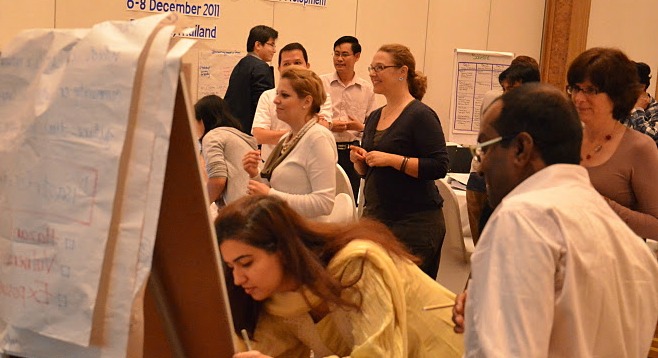Preferences and practices
Are you a big picture person or a stickler for detail? Do you prefer to work in a structured way or to let things evolve? Are you an introvert or extrovert? Do you like to be in control or prefer others to take the lead?
Whatever your personality traits or preferences, each has an influence on how you work and interact with others. And if your job involves bringing people together to meet a particular objective, convening workshops and meetings, then knowing yourself, and how others see you, is critical to creating a harmonious and productive environment.
Your worldview, your culture, your opinions, what you do, and even what you wear, can all have an influence on people and on group dynamics. How closely you want to work with others, how much you need to relate to a group, and how you prefer others to behave towards you, all have a bearing on your performance. Identifying these preferences is important to your self-awareness and your continual development as a facilitator of collaborative group processes.
Gillian Martin Mehers and Lizzie Crudgington of the Bright Green Learning Academy describe their respective preferences and how these influence their work, and the strategies they use to amplify or manage them.

Gillian
I’m an extrovert on the MBTI (Myers-Briggs Type Indicator) and a ‘learner’ (using the Strengthsfinder vocabulary) and enjoy leading discussions. As someone who likes to learn new things all the time, I can draw on many different facilitation tools and techniques that I have used over the years. However, this means that I need to be careful to check with those I’m working with to make sure they are comfortable trying something new. They might be at a different stage of the collaborative process, where even breaking into small groups, away from the security of a plenary discussion, might test the comfort levels, trust and confidence of participants. So I need to manage my enthusiasm and eagerness to always be pushing into new territory in terms of methodologies and approaches.
I am also strong on the ‘inclusion’ trait (according to the FIRO-B diagnostic tool), which means that I like to be included and have a formal role in a workshop or meeting. I have a genuine desire to work with people, to help them achieve their goals, but I need to be conscious of not taking on too much of a role that could reduce the group’s sense of ownership in their process and results. In designing a workshop, I always build in a gradual ‘handing over’ of leadership so that the energy and momentum for follow-up rests with the group, and not with me as an external facilitator. Thinking about how your behavioural preferences reveal themselves in your facilitation work takes effort and introspection, but this awareness can help make you a better host and (temporary) holder of the process!
Lizzie
Different to Gillian, I’m an introvert on the MBTI and prefer not to be the focus of attention, so at the start of a session, I’m keen to get participants interacting with each other as quickly as possible (and shift the focus from me). I don’t feel a particular need to be included, this shows up on my FIRO-B test, but this may make me seem disinterested! It’s important to realise how others perceive you and perhaps adjust your behaviour accordingly.
Overall, it’s important to play to your strengths for the good of the group. Although I enjoy interacting with people, as a facilitator, I don’t feel I’m there to be the constant centre of attention. I do what I need to do to achieve the session’s objectives from the sides of the discussion, more as an objective process designer, guide and observer. That way, I find it easier to manage conflict if it arises. Sometimes in a heated discussion a verbal punching bag is needed and I’m happy to act as one if that’s what it takes to move ahead!
I’m what is called a ‘maximiser’ in Strengthsfinder language which means that I want to make everything as good as it can possibly be. I like to put my energy into turning something good into something great. So I like to push a group to achieve more than they set out to. But that means constantly ‘checking in’ to make sure they are comfortable with going the extra mile as sometimes the ‘just enough’ point is still a little distance from where I might, as a maximiser, be happy to take them.
It is important to be aware and continually adjust to evolving situations and group dynamics. It’s a continuous and fascinating process of evolution!
Read more…
I’m the Facilitator – How might you be affecting your facilitation work?
Me, my behavioural preferences and my facilitation practice – What are some common ‘learning edges’ – skills to strengthen – for facilitators and conveners?




Leave a Reply
Want to join the discussion?Feel free to contribute!